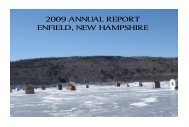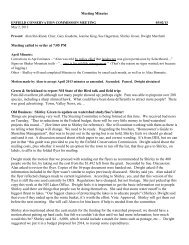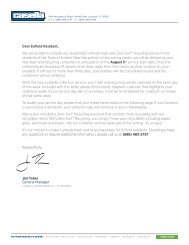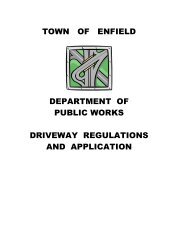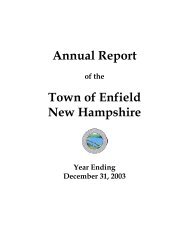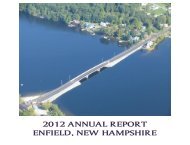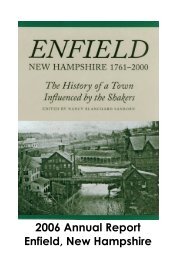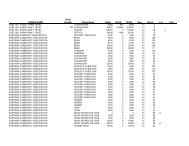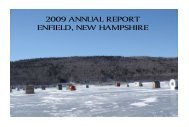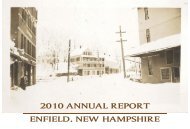2010 ANNUAL REPORT ENFIELD, NEW ... - Town of Enfield
2010 ANNUAL REPORT ENFIELD, NEW ... - Town of Enfield
2010 ANNUAL REPORT ENFIELD, NEW ... - Town of Enfield
Create successful ePaper yourself
Turn your PDF publications into a flip-book with our unique Google optimized e-Paper software.
<strong>Town</strong> Forest Fire Warden & State Forest Ranger<br />
Your local Forest Fire Warden, Fire Department, and the State <strong>of</strong> New<br />
Hampshire Division <strong>of</strong> Forests & Lands, work collaboratively to reduce the risk<br />
and frequency <strong>of</strong> wildland fires in New Hampshire. To help us assist you, please<br />
contact your local Forest Fire Warden or Fire Department to determine if a<br />
permit is required before doing ANY outside burning. Under State law (RSA<br />
227-L:17) a fire permit is required for all outside burning, unless the ground is<br />
completely covered with snow. The New Hampshire Department <strong>of</strong><br />
Environmental Services also prohibits the open burning <strong>of</strong> household waste.<br />
Citizens are encouraged to contact the local fire department or DES at 1-800-<br />
498-6868 or www.des.state.nh.us for more information. Safe open burning<br />
requires diligence and responsibility. Help us to protect New Hampshire’s forest<br />
resources. For more information please contact the Division <strong>of</strong> Forests & Lands<br />
at (603) 271-2214, or online at www.nhdfl.org.<br />
This past fire season had a slightly lower number <strong>of</strong> fires, as well as<br />
lower number <strong>of</strong> acres burned then the 5 year average. What made this fire<br />
season somewhat unusual was that it lasted most <strong>of</strong> the summer. New Hampshire<br />
typically has a fairly active spring fire season and then the summer rains tend to<br />
dampen fire activity later in the season. This year virtually all areas <strong>of</strong> the state<br />
had fires throughout the summer due to the periodic dry spells throughout the<br />
season. As has been the case over the last few years, state budget constraints<br />
have limited the staffing <strong>of</strong> our statewide system <strong>of</strong> 16 fire lookout towers to<br />
Class III or higher fire danger days. Despite the reduction in the number <strong>of</strong> days<br />
staffed, our fire lookouts are credited with keeping most fires small and saving<br />
several structures due to their quick and accurate spotting capabilities. The<br />
towers fire spotting was supplemented by contracted aircraft and the NH Civil<br />
Air Patrol when the fire danger was especially high. The largest fire for the<br />
season was 10.3 acre fire in Charlestown. Many homes in New Hampshire are<br />
located in the wildland urban interface, which is the area where homes and<br />
flammable wildland fuels intermix. Several <strong>of</strong> the fires during the <strong>2010</strong> season<br />
threatened structures, a constant reminder that forest fires burn more than just<br />
trees. Homeowners should take measures to prevent a wildland fire from<br />
spreading to their home. Precautions include keeping your ro<strong>of</strong> and gutters clear<br />
<strong>of</strong> leaves and pine needles, and maintaining adequate green space around your<br />
home free <strong>of</strong> flammable materials. Additional information and homeowner<br />
recommendations are available at www.firewise.org. Please help Smokey Bear,<br />
your local fire department, and the state’s Forest Rangers by being fire wise and<br />
fire safe!<br />
205



